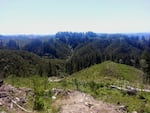
A proposal to devote the Elliott State Forest to research has hit a snag.
Oregon Department of State Lands
Oregon State University is backing out of plans to take ownership of the Elliott State Forest, saying the financial risk is too high.
A committee advising OSU and the Department of State Lands in the establishment of the Elliott State Research Forest met Wednesday to discuss the forest’s future. OSU officials told the panel that they worry what might happen if the forest isn’t economically self-sufficient.
“It really comes down to financial risk, from the Oregon State perspective,” said Paul Odenthal, OSU’s senior associate vice president for finance and administration, “of how we’re able to protect the university and make sure that this isn’t an undertaking that would fall on us as the tuition dollars of our students having to support the forest.”
It’s a new twist in the yearslong effort to find a purpose for the 91,000-acre forest in Coos and Douglas counties near Oregon’s south coast.
Oregon established the Elliott State Forest in 1930, linking it to the Common School Fund. The idea was to use timber revenue generated by the forest to help pay for public education.
However, the Elliott also provides prime habitat for federally protected species like the northern spotted owl and marbled murrelet, according to Portland Audubon. That’s limited logging on the forest, and so the state has struggled to meet its financial obligation to schools.
Oregon’s tried selling pieces of the Elliott in recent years to private timber companies, but courts have ruled that the forest must remain in public ownership. The state has also sold bonds to pay some of what it owed schools.
Last December, the Land Board — then comprised of Gov. Kate Brown, Treasurer Tobias Read and the secretary of state at the time, Bev Clarno — unanimously voted to move forward with OSU’s proposal to devote the Elliott to research.
The plan would keep the Elliott in the public’s hands, make the forest a hub for research and split it off from the Common School Fund. Brown described the proposal as the antithesis of “crisis and chaos.”
It would appear that a degree of crisis and chaos have returned as the advisory committee explores other ownership options for the research forest.
The leading idea was to establish a public corporation similar to Oregon Health & Science University or the Oregon State Fair to take ownership of the forest, while OSU would manage it.
Public corporations are defined in Oregon state law as entities created by the government to carry out public missions. They have some of the flexibility of private companies but are still subject to public accountability measures.
Creating a public corporation to own the forest would require legislative approval, but panelists at Wednesday’s meeting said it gives Oregon the best chance to achieve its stated goals for the Elliott while also limiting financial liability for the university and the Department of State Lands.
“We’ve got longevity in mind because Oregon State doesn’t want to take over a forest for research and then have the rug pulled out from under them in 15 or 20 years,” said State Lands Director Vicki Walker, a former state representative, during Wednesday’s meeting.
Members of the public who commented during the virtual meeting balked at the idea of turning a forest over to a “corporation.” Commenters said the advisory committee was focused too much on making money off the forest and too little on the forest’s ecological significance.
“I’m unhappy. I’m disappointed about the way you treat public opinion,” said writer and academic Barry Sanders. “I’m even more disappointed in your off-hand treatment of the Elliott State Forest. I find it more than slightly eerie that we are still discussing the fate of the forest, and now in legal terms.”
Others suggested adding biologists and ecologists to the advisory committee. People also sought a clearer definition of what a public corporation is.
The Elliott State Research Forest Advisory Committee will meet again via Zoom at 9 a.m. PT on Wednesday, Sept. 22.
Correction: An earlier version of this story and headline inaccurately described Oregon State University’s plan for the Elliott State Forest. The university no longer wants to take ownership of the forest. OPB regrets the error. An earlier version of the story also did not clearly reflect that the advisory committee’s role is strictly to advise decisions around the creation of an Elliott State Research Forest. This story has been updated to clarify the role of the advisory committee in the proposal to create the Elliott State Research Forest.
